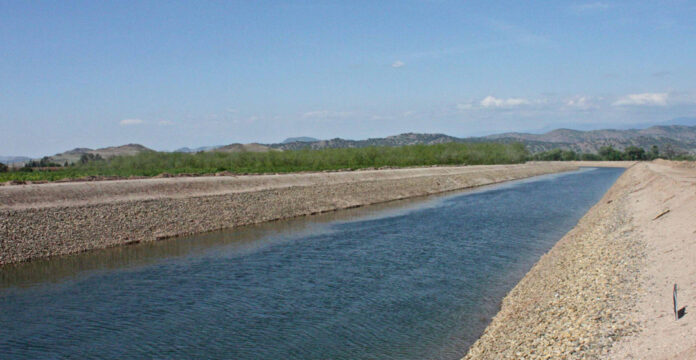The regular monthly meeting of the Madera Irrigation District board of directors was held in person on February 21, 2023 at the District offices on the south side of Madera. The full board was in attendance when President Jim Erickson called the open session to order at 2:04 p.m., following the regular hour long closed session. The flag was saluted and there was nothing to report from closed session and no recusals for conflict of interest. Board Secretary Andrea Sandoval read the language specifying how public comment is to occur. None was forthcoming at that moment but there was public discussion of several items later in the meeting.
The GSA Meeting
The GSA board meeting was convened with Assistant General Manager Dina Nolan providing an update. She said about 35 people attended an informational meeting on farm recharge was held in January 19 in conjunction with the Natural Resources Conservation Service. She said that the District had received a $1.5 million grant from NRCS for on-farm projects. A news release was sent out last week which also noted that MID was one of only three entities in the western states to receive this funding. She said NRCS is taking applications from landowners from now through April 3. Also, NRCS is making available additional funding through a pilot program. She said that staff is recommending that the board approve posting an RFP (request for proposals) to purchase land to build additional recharge basins. Two previous purchases have been turned into significant basins, she said.
applications from landowners from now through April 3. Also, NRCS is making available additional funding through a pilot program. She said that staff is recommending that the board approve posting an RFP (request for proposals) to purchase land to build additional recharge basins. Two previous purchases have been turned into significant basins, she said.
At that, member of the public Ralph Pistoresi, a local grower, asked how many sites and how many acres are currently being used for recharge by the District. Nolan replied that there are nine basins currently, but she did not have the acreages immediately at hand. He also asked about repairs along the banks of Dry Creek. Operations and Maintenance Manager Charles Contreras replied that water levels were being lowered so that repairs could be done, likely to be completed by next week.
Nolan continued saying that staff had been meeting with the other GSAs in the Subbasin talking about updating the GSP due in March and the annual report due in this spring. Christina Beckstead, executive director of Madera County Farm Bureau, asked about progress on that work and Nolan replied it was ongoing.
The MID Meeting
Reconvening as the District board at 2:10 p.m., President Erickson invited action on the consent agenda which included eight items. On this list was approval of minutes of previous meetings, financial reports for November and December and payment of bills on the warrant list totaling $2,188,945.46. Also included was acceptance of the Finance Department report disclosing payments of $100 or more to employees and directors, updates on eight District policies, disposal of surplus equipment and approval of the emergency notice allowing meetings to be conducted on Zoom, as this one was. Board approval was unanimous.
Department report disclosing payments of $100 or more to employees and directors, updates on eight District policies, disposal of surplus equipment and approval of the emergency notice allowing meetings to be conducted on Zoom, as this one was. Board approval was unanimous.
Next, Manager Contreras gave his usual detailed report on repairs and maintenance of District infrastructure as well as work in the shop on the large fleet of vehicles and equipment. His report in the Board folder runs for eight pages and includes many photos of work in progress and completed. The directors had several questions and comments about various projects. There was discussion of algae formations in ditches and canals. Contreras said that chemicals, even copper sulfate, are not as effective in the cold weather. General Manager Tom Greci thanked Contreras and his staff for their diligent work requiring many overtime hours during the recent rains and resulting flood flows.
At this point MCFB’s Beckstead asked if she could be notified when certain spraying was being done. She said some of her members had been notified of exceeding chemical limits in farm water tested routinely by the Water Quality Control Board. During discussion, it was pointed out that the District conducts spraying frequently to limit weed growth, always carefully following label instructions. Also, the District does not use any insecticides which are sometimes identified by the testing. AGM Nolan suggested that Beckstead provide testing locations and dates in coordination with Contreras.
Recharge & Leaky Pipes
In other discussion, Director Carl Janzen asked if any pictures of full recharge basins had been posted to the District website, illustrating for everyone how recharge was a top priority this season. Pistoresi asked if recharge on wetlands near Madera Community College had been considered. Greci replied that there has been contact with college administration to consider that possibility.
Director Brian Davis asked about what seems like many leaks in District piping. He asked could it be due to full water flows through what had been dormant ditches. Contreras said there didn’t seem to be any particular reason. Davis asked if it could be ground movement or air pressure in the lines. Director Dave Loquaci pointed out there are literally hundreds of miles of infrastructure for water flows. Greci noted that the District has a long term plan to upgrade and replace older pipes and is actually running ahead of schedule. Contreras also noted that there had not been as many opportunities for work to be done with so much water in the system since January.
Finance
At 2:30 p.m. by prearrangement, the board heard once again about an opportunity to earn a higher return on its fund balances using California CLASS, a joint powers authority investment pool, while staying within the strict guidelines for public agencies. On hand was Bob Shull, director, investment services for the organization which offers cash management services to 39 participants in the state with some $439 million in assets in the pool, with the cities of Porterville, Kingsburg and Shafter joining recently. He said his company nationally now manages $70 billion of public funds across 17 states, investing very conservatively in treasury bonds, commercial paper and bank CD’s as required in California.
management services to 39 participants in the state with some $439 million in assets in the pool, with the cities of Porterville, Kingsburg and Shafter joining recently. He said his company nationally now manages $70 billion of public funds across 17 states, investing very conservatively in treasury bonds, commercial paper and bank CD’s as required in California.
He had presented this option at the September meeting. The information for the board showed a recent 4.9 percent return recently compared with about 1.5 percent for the California LAIF (Local Area Investment Fund). Shull explained that LAIF investments have maturities of about one year, while CLASS is 28 days on average, allowing a faster response to market changes.
No minimum investment is required, there are no transaction fees and funds are immediately available on the same day when requested by 11 a.m. MID has some $46 million in unrestricted funds, but the directors took a conservative approach. The consensus from staff and the board was to invest $5 million, to “put a toe in the water” as Director Janzen observed.
GM Report
Greci then continued with his GM’s report. He said the Friant Water Authority annual meeting will be held on April 13, a dinner meeting in Visalia and the first in several years due to COVID. President Erickson is the current Authority chairman. Greci also said the ACWA (Association of California Water Agencies) spring conference will be held May 9 – 11 in Monterey. Directors were urged to make plans early since hotel rooms are at a premium for this statewide event. Greci said power was being generated by the Madera – Chowchilla Water & Power Authority. Challenges had been the flood flows, some needed repairs and theft of copper wire from the some of the AT&T electronic equipment.
The staff continues to assist with the “unwinding” of the long inactive San Joaquin Water & Power Authority as approved at earlier meetings. He observed it’s harder to end an organization than start one.
He said he had made a presentation on the District and water issues at a meeting of the Madera Association of Realtors. He said attendance was about 40 people who had lots of questions about SGMA and its impact. He was the timing worked out well because the group members had received a letter just that day from Madera County on the topic of SGMA.
Water Supplies
Moving on to the all-important topic of water supplies, he said it’s still the 2022-2023 water year, until March 1, and it looks like a 50 percent allocation of Class 1 water will be the total with some carry over. He said if the current storms and the rest of the season remain cold, delaying snow melt, it could be the best year on record. Or, he said, if it gets warm and snow melts fast, summer water would not be as available. The storms predicted in the next ten days would have an impact. Erickson added that there is a lot of snow in the mountains according to the ongoing measurements.
Greci said there had been some limitations on the ability to store water in Hensley Lake due to flood control issues and that the Fresno River remained wet (and flowing). He concluded saying that since the District began water deliveries on January 4, about 20,000 A/F had been received from Millerton Lake and about 10,000 or 15,000 A/F from Hensley, with those figures not yet final. He congratulated the board for its investment in recharge and growers for coming to get the water.
Pistoresi injected with a question about how long $10 water would be available and was told that was an agenda item to be handled in a moment.
Action Items
On the agenda, the board approved amendments to the Bylaws which had been under review for some time. The completed document appears in the board folder. Approval was unanimous without discussion. The board approved membership on three standing and one ad-hoc committee as well as director and staff representation on boards of 14 outside groups.
Next was the topic of water distribution and pricing in the new year, beginning March 1. Greci said that every foot of water delivered at a loss may have impacts later. He said, “We expect to be able to run into the fall, but that could change with a big, warm storm [causing rapid snow melt.]” He suggested not adjusting the price until the end of February. He said deliveries had dropped recently because some systems had to be shut down for repairs, which were made as quickly as possible.
Directors were invited to comment and Loquaci said let’s keep the price and see about the impact of the storms. Janzen said he had considered a new price beginning March 1 but says he now feels the current $10 price could continue to April 1. Greci suggested go to mid-March and then see about the situation. Davis said he’s taken as much as he can on his ranch and enjoys the photos of water ten inches deep. He said let’s leave the $10 price and see about the storms. Director Tim DaSilva said we’ve been telling everyone to recharge. Erickson summed up the consensus saying let’s see if we can delay [a price increase] until the March meeting (March 15) and a special meeting can be held if needed. Greci concluded saying we’ll watch the weather patterns and other factors, and we can call a special meeting if needed. Earlier in the meeting it had been noted that the $10 price is very much a loss for the District in the sense that it is paying $42 per AF for Friant water and then has all the costs of distribution. All growers are paying for it, whether or not they purchase water.
The last item of new business was a resolution approving the purchase of two new Toshiba copy machines. The benefits, according to Greci, are a savings of $100 per month over current costs and an improvement in staff morale!
Closing Comments
The meeting concluded with reports from the directors. DaSilva noted his participation the next day in Los Banos for a meeting of the RMC (San Joaquin River Resource Management Coalition). Davis apologized for missing January meetings but said the birth of a new baby daughter had kept him at home with his family. Janzen said he had attended the Mid-Pacific Water Users Conference in Reno last month. He noted that he “dodged a bullet” and was no longer chairman of the Madera Regional Water Management Group. With all the wet weather and related recharge, Loquaci reported that three formerly dry holes on his ranches were now pumping water. Erickson concluded saying that his Friant work was now focused on reworking MOUs with the Exchange Contractors, no small nor easy task.
And with that, the meeting adjourned at 3:10 p.m.
Madera ID Also Held a Special Board March 2nd
A special meeting of the board of directors of the Madera Irrigation District was held on March 2, 2023 with the open session called to order at 1:32 p.m. There was nothing to report from the half hour closed session held earlier. President Jim Erickson led the pledge and invited public comment. Grower Mickey Basra asked the board if he could receive water for his property which is not in the District. He said he has a neighbor on one side in MID and a neighbor on the other in the Chowchilla Water District. The reply was that while some current flood water was being sold to non-members with facilities to take it, in recent seasons there had not been enough water even for members. It was also noted that several property owners had requested they be included but no new growers are being accepted at this point. Basra said he would donate two acres to the District. He was thanked and invited to submit a specific proposal in writing for consideration by staff and board. Basra said his thanks and left the meeting.
General Manager Tom Greci made his report. He said favorable publicity for the District resulted from two recent media reports. The current ACWA newsletter mentioned the MID recharge efforts in a story about how districts were managing the heavy precipitation. The JPIA (Joint Powers Insurance Authority) publication, Perspective, reported the safety award received earlier by Operations and Maintenance Manager Charles Contreras.
Greci then talked about water supply, saying, “Yeah, it’s rained and snowed a lot!” He said starting the new water year (March 1), the Bureau had been increasing its allocations. It usually asks for a plan from the District as to how its water will be used. Greci said he’s never been asked to prepare a plan for 100 percent allocation of both Class 1 and Class 2 water. At the end of the meeting, Board Secretary Andrea Sandoval said it was in 1995, the last time there was 100 percent allocation for both classes.
Greci went on to say that the Corps is releasing water from Hensley Lake at the rate of 1700 cfs and more storms are predicted in the coming weeks. The directors commented on the beautiful snow visible in the East on the Sierra coming all the way to the bottom while the Coastal Range on the west side has snow visible all along the peaks. Greci said the recent windstorms have caused many trees and limbs to fall in creeks, with water backing up behind bridges and keeping the MID crew very busy preventing flooding. Sections of several roads are closed, nonetheless. He said it’s all about managing flood flows now with no need to adjust the $10 rate until the March regular meeting, unless there is a real shift in the weather.
Three items of new business were promptly and unanimously dispatched. Updated Crop Water Rules and Regulations were approved, with some adjustments made since the current version was enacted in 2019. Assistant General Manager Dina Nolan said there were no substantive changes. A redlined draft and the final copy approved were in the board packet. The updated version will be printed and distributed promptly.
Also documents were approved for the purchase of a parcel of land and easements with the Smith Adobe Ranch for the MID intake facility on the Fresno River. District counsel John Kinsey said the documents “memorialized in writing” unrecorded easements that had been in effect. Director Loquaci thanked Kinsey and the Adobe Ranch folks for reaching this agreement. Kinsey said it was a credit to all parties that this issue has been resolved in a mutually agreeable manner.
The final item once again involved the 10,900 acres of rangeland owned by the District west of Madera. At the December 15 meeting, a routine exemption was passed for notification of neighboring agencies, there being none. At this meeting the board approved the exemption of this property from the California Environmental Quality Act. While there are no plans to sell the property and the current leases are being maintained, these two housekeeping items provide the District with a full range of options for the future. With no further business, the board adjourned at 1:48 p.m.
DISCLAIMER OF RESPONSIBILITY; Waterwrights strives to provide clients with the most complete, up-to-date, and accurate information available. Nevertheless, Waterwrights does not serve as a guarantor of the accuracy or completeness of the information provided, and specifically disclaims any and all responsibility for information that is not accurate, up-to-date, or complete. Waterwrights’ clients therefore rely on the accuracy, completeness and timeliness of information from Waterwrights entirely at their own risk. The opinions expressed in this report are those of the author and do not represent any advertisers or third parties.
ALL RIGHTS RESERVED. Copyright 2022 by WaterWrights.net
Madera Irrigation District – 12152 Road 28 ¼ Madera, CA 93637 559/673-3514
Staff: General Manager -Thomas Greci, Assistant GM – Dina Nolan
Board: Jim Erickson, Chair; Tim DaSilva, Brian Davis, Carl Janzen and Dave Loquaci
HISTORY: From www.madera-id.org The Madera Irrigation District (MID or District) encompasses an area of approximately 139,665 acres. MID operates a primarily gravity irrigation distribution system with approximately 300 miles of open flow canal systems as well as 150 miles of large diameter pipelines.
The District has a Central Valley Project (CVP) repayment contract with United States Bureau of Reclamation (USBR) providing up to 85,000 acre feet (AF) of Class 1 and 186,000 AF of Class 2 water per year from the Friant Division (Millerton Lake). The CVP water is released from Millerton Lake through the Friant Dam, and then conveyed through the Madera Canal for delivery into the District’s service area. The District also entered into a CVP repayment contract with the USBR for the yield from the Hidden Unit (Hensley Lake). Under the Hidden Unit contract, the average annual supply available to the District is approximately 24,000 AF per year.
DWR SGMA # 5-022.06






























